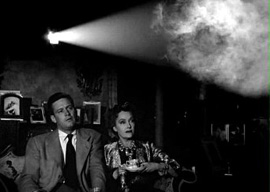
February 20, 2013

William Holden and Gloria Swanson in Sunset Boulevard
Back in the 1920s, Sir Francis had been “chief script-writer of Megalopolitan Pictures,” but by now he’s barely hanging on in the publicity department. Some of Wilder’s description of Norma’s estate is a rewrite of Waugh’s depiction of Sir Francis’s once-fashionable grounds. In his Augustan style, Waugh recalls, “His swimming pool which had once flashed like an aquarium with the limbs of long-departed beauties was empty now and cracked and over-grown with weed.” In his Raymond-Chandler-without-the-poetry manner, Wilder has Holden narrate, “And of course she had a pool. Who didn’t then? Mabel Norman and John Gilbert must have swum in it ten thousand midnights ago….It was empty now.” (Spoiler alert: Once refilled, the pool plays a major role in Sunset Boulevard.)
When Megalopolitan fires Sir Francis, he kills himself. As Sir Francis’s only “Loved One” (the term used by the Forest Lawn-like funeral complex), he meets naive and melancholy cosmetician Aimée Thanatogenos. The heartless poet then outmaneuvers head mortician Mr. Joyboy for her hand.
Upon finally wising up to her fiancé‘s opportunism, she exclaims: “An American would despise himself for living off his wife.” Dennis patiently responds, “Yes, but you see, I’m English, and we have none of these prejudices in the older and more developed civilizations.”
Wilder and Brackett reversed this, giving Joe, a newspaperman from Dayton, Ohio, a bad case of American self-loathing for allowing himself to be kept by Norma. When Betty Schaefer, a pretty 22-year-old aspiring screenwriter who wants Joe to work with her on a screenplay of one of his ideas, asks, “Where have you been keeping yourself?” he responds, “I haven’t been keeping myself at all, lately.”
This cynical Bob Hope-style self-contempt worked well for Holden (who looked and sounded like a more strapping version of Hope). It earned Holden the first of his three Oscar nominations. But Hope’s shtick was that his comic lack of self-esteem stemmed from his physical cowardice (a highly relevant character trait during World War II).
In contrast, it’s not clear why Holden’s Joe is so mortified by shame beyond all redemption when young Betty finally discovers his gigolo-like arrangement with Norma.
Is it because he doesn’t support himself? But Betty is a true believer in Joe’s underappreciated talent, having worked for weeks with him on a promising script.
Is it because Joe’s sleeping with an older woman, albeit the most glamorous woman of her time? Perhaps, but a generation later, we saw a test case of this in the extremely well-publicized 1970s relationship of Burt Reynolds with talk-show hostess Dinah Shore, who was two decades older. It didn’t seem to slow Reynolds’s ascent to superstardom at all. Wikipedia explains, “The relationship gave Shore an updated, sexy image, and took some of the pressure off Reynolds in maintaining his image as a ladies’ man.” (Don’t ask me what that clause about Reynolds means.)
What would make some psychological sense out of Sunset Boulevard‘s histrionic conclusion is if Betty discovers that Joe is living not with an older woman, but with an older man, much like Dennis in the opening scenes of The Loved One.
This presumption that Wilder at one time conceived of Sunset Boulevard as a homosexual relationship isn’t wholly implausible. Hollywood’s unofficial history is full of young men who accepted a hand up, then switched teams back to their more natural side once established.
Wilder himself was married for all but three years from 1936 to 2002. He took pains to emphasize to Cameron Crowe in a book-length interview in 1996 that his own days as a Weimar gigolo were quite respectable, with him merely serving as a waltz partner for rich fat matrons whose watching husbands no longer cared to dance.
But Wilder’s running joke about gay subtexts finally burst through in his most famous line, the last one in 1959’s Some Like It Hot. Jack Lemmon, having spent the movie in drag to escape from Al Capone’s gang, explains in frustration to ardent yachtsman Joe E. Brown that they can’t marry because”ripping off his wig and dropping his falsetto”“I’m a man.”
Brown placidly replies, “Well, nobody’s perfect.”
Indeed, Wilder’s tombstone reads:
I”M A WRITER
BUT THEN
NOBODY’s PERFECT
Yet Wilder’s essential insight that makes Sunset Boulevard more memorable than The Loved One (even to Sunset Boulevard’s huge gay fan base) is that male and female”Joe and Norma”are just more interesting than Joe and Norman.